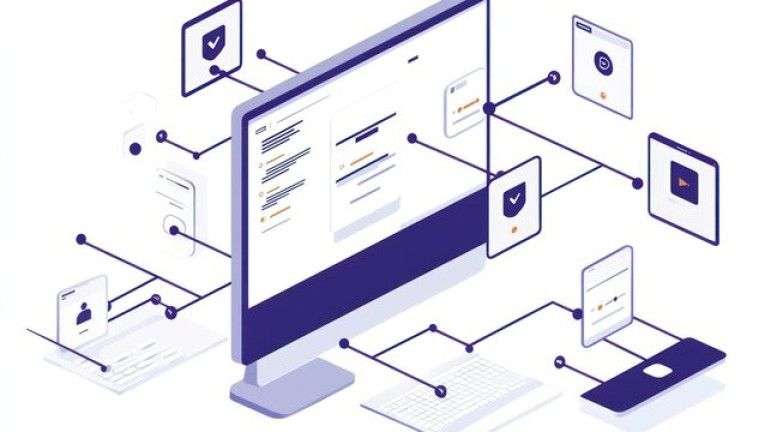As an investment expert, I have spent years analyzing emerging technologies and their potential to disrupt traditional industries. One of the most intriguing projects I have come across is Akash Blockchain, a decentralized cloud computing platform that leverages blockchain technology to create a more open, efficient, and cost-effective cloud infrastructure. In this article, I will delve deep into what Akash Blockchain is, how it works, and why it could be a game-changer in the world of cloud computing. I will also explore its investment potential, comparing it to traditional cloud providers and other blockchain-based solutions. By the end of this article, you will have a clear understanding of Akash Blockchain and its place in the future of decentralized technology.
Table of Contents
What is Akash Blockchain?
Akash Blockchain is a decentralized cloud computing marketplace built on the principles of blockchain technology. It aims to disrupt the traditional cloud computing industry by offering a more open, transparent, and cost-effective alternative to centralized cloud providers like Amazon Web Services (AWS), Microsoft Azure, and Google Cloud. Akash allows users to buy and sell computing resources in a peer-to-peer manner, eliminating the need for intermediaries and reducing costs significantly.
The Akash Network is powered by its native token, AKT, which is used for staking, governance, and payments within the network. By leveraging blockchain technology, Akash ensures that all transactions are secure, transparent, and immutable. This creates a trustless environment where users can interact directly with each other without relying on a central authority.
How Does Akash Blockchain Work?
To understand how Akash Blockchain works, it is essential to break down its core components and processes. At its heart, Akash is a decentralized marketplace where users can buy and sell computing resources. These resources include CPU, GPU, memory, and storage, which are essential for running applications, websites, and other digital services.
The Akash Marketplace
The Akash Marketplace is the backbone of the network. It connects buyers (tenants) with sellers (providers) of computing resources. Providers can be anyone with spare computing capacity, from individuals with idle laptops to large data centers with unused servers. Tenants, on the other hand, are developers, startups, or enterprises looking for affordable and scalable cloud infrastructure.
The marketplace operates on a bidding system. Tenants specify their requirements, such as the amount of CPU, memory, and storage they need, and providers submit bids offering their resources at a certain price. The tenant then selects the best bid based on price, performance, and other factors. Once a match is made, the tenant deploys their application on the provider’s infrastructure, and the provider is paid in AKT tokens.
The Akash Token (AKT)
AKT is the native cryptocurrency of the Akash Network. It serves three primary functions within the ecosystem:
- Staking: AKT holders can stake their tokens to secure the network and earn rewards. Staking involves locking up AKT tokens in a wallet to participate in the network’s consensus mechanism. In return, stakers receive a portion of the network’s transaction fees and block rewards.
- Governance: AKT holders have the right to participate in the governance of the network. They can vote on proposals that affect the future development and direction of Akash. This ensures that the network remains decentralized and community-driven.
- Payments: AKT is used as the primary medium of exchange within the Akash Marketplace. Tenants pay providers in AKT for the computing resources they use, and providers can use AKT to purchase additional resources or convert it to other cryptocurrencies or fiat.
The Akash Deployment Process
Deploying an application on Akash is a straightforward process that involves the following steps:
- Define the Requirements: The tenant specifies the computing resources they need, such as CPU, memory, and storage. They also define the container image (e.g., Docker) that contains their application.
- Submit a Deployment Request: The tenant submits a deployment request to the Akash Marketplace. This request includes the resource requirements and the container image.
- Bidding Process: Providers review the deployment request and submit bids offering their resources at a certain price. The tenant can then choose the best bid based on their needs.
- Deploy the Application: Once a bid is accepted, the tenant deploys their application on the provider’s infrastructure. The provider is responsible for ensuring that the application runs smoothly and meets the tenant’s requirements.
- Payment: The tenant pays the provider in AKT tokens for the resources used. Payments are made automatically based on the agreed-upon terms.
Why Akash Blockchain Matters
The traditional cloud computing industry is dominated by a few large players, such as AWS, Microsoft Azure, and Google Cloud. These companies control a significant portion of the market, leading to high prices, limited competition, and a lack of transparency. Akash Blockchain aims to address these issues by creating a decentralized marketplace where anyone can buy and sell computing resources.
Cost Efficiency
One of the most significant advantages of Akash is its cost efficiency. By eliminating intermediaries and allowing users to interact directly, Akash reduces the cost of cloud computing significantly. According to Akash’s own estimates, its platform can be up to 10 times cheaper than traditional cloud providers. This is a game-changer for startups and small businesses that need affordable cloud infrastructure to scale their operations.
Decentralization
Decentralization is at the core of Akash’s philosophy. Unlike traditional cloud providers, which are centralized and controlled by a single entity, Akash is a decentralized network where no single party has control. This ensures that the network is more resilient, secure, and transparent. It also reduces the risk of censorship and single points of failure.
Transparency and Security
Blockchain technology ensures that all transactions on the Akash Network are transparent and secure. Every transaction is recorded on the blockchain, making it immutable and tamper-proof. This creates a trustless environment where users can interact with each other without relying on a central authority. Additionally, the use of smart contracts automates the deployment and payment processes, reducing the risk of fraud and human error.
Flexibility and Scalability
Akash offers unparalleled flexibility and scalability. Users can easily scale their computing resources up or down based on their needs, without being locked into long-term contracts or paying for unused capacity. This is particularly beneficial for businesses with fluctuating workloads, such as e-commerce platforms during peak seasons or startups experiencing rapid growth.
Investment Potential of Akash Blockchain
As an investment expert, I am always on the lookout for projects with strong fundamentals and long-term potential. Akash Blockchain is one such project that has caught my attention. Here are some factors that make Akash an attractive investment opportunity:
Market Opportunity
The global cloud computing market is massive and continues to grow at a rapid pace. According to a report by Grand View Research, the global cloud computing market size was valued at $274.79 billion in 2020 and is expected to grow at a compound annual growth rate (CAGR) of 19.1% from 2021 to 2028. Akash is well-positioned to capture a significant portion of this market by offering a more cost-effective and decentralized alternative to traditional cloud providers.
Strong Team and Partnerships
Akash is backed by a strong team of experienced professionals with a proven track record in the tech and blockchain industries. The project has also formed strategic partnerships with leading organizations in the blockchain space, such as Cosmos and Interchain Foundation. These partnerships provide Akash with the resources and expertise needed to succeed in a competitive market.
Growing Ecosystem
The Akash ecosystem is growing rapidly, with an increasing number of users, providers, and developers joining the network. This growth is driven by the platform’s cost efficiency, decentralization, and ease of use. As more users join the network, the demand for AKT tokens is likely to increase, driving up their value.
Tokenomics
AKT has a well-designed tokenomics model that incentivizes participation in the network. The token is used for staking, governance, and payments, creating a strong demand for AKT. Additionally, the network’s inflationary model rewards stakers with new AKT tokens, providing an additional incentive for users to hold and stake AKT.
Competitive Advantage
Akash has several competitive advantages that set it apart from other blockchain-based cloud computing projects. These include its cost efficiency, decentralization, and ease of use. Additionally, Akash is built on the Cosmos SDK, which allows it to interoperate with other blockchain networks, further enhancing its utility and value.
Comparing Akash Blockchain to Traditional Cloud Providers
To better understand Akash’s value proposition, it is helpful to compare it to traditional cloud providers like AWS, Microsoft Azure, and Google Cloud. The following table highlights the key differences between Akash and these traditional providers:
| Feature | Akash Blockchain | AWS | Microsoft Azure | Google Cloud |
|---|---|---|---|---|
| Cost | Up to 10x cheaper | Expensive | Expensive | Expensive |
| Decentralization | Fully decentralized | Centralized | Centralized | Centralized |
| Transparency | High (blockchain-based) | Low | Low | Low |
| Security | High (blockchain-based) | High | High | High |
| Flexibility | High | Medium | Medium | Medium |
| Scalability | High | High | High | High |
| Ease of Use | Medium | High | High | High |
As the table shows, Akash offers several advantages over traditional cloud providers, particularly in terms of cost, decentralization, and transparency. However, it is worth noting that traditional providers still have an edge in terms of ease of use and established market presence. That said, as Akash continues to grow and mature, it is likely to close this gap and become a more viable alternative for a wider range of users.
Comparing Akash Blockchain to Other Blockchain-Based Cloud Computing Projects
Akash is not the only blockchain-based cloud computing project in the market. Other notable projects include Filecoin, Golem, and Ankr. The following table compares Akash to these projects based on key features:
| Feature | Akash Blockchain | Filecoin | Golem | Ankr |
|---|---|---|---|---|
| Focus | General cloud computing | Decentralized storage | Distributed computing | Node infrastructure |
| Cost Efficiency | High | Medium | Medium | Medium |
| Decentralization | High | High | High | Medium |
| Transparency | High | High | High | Medium |
| Security | High | High | High | Medium |
| Flexibility | High | Medium | Medium | Medium |
| Scalability | High | High | Medium | Medium |
| Ease of Use | Medium | Medium | Low | Medium |
As the table illustrates, Akash stands out for its focus on general cloud computing, cost efficiency, and flexibility. While Filecoin and Golem have their strengths, they are more specialized in decentralized storage and distributed computing, respectively. Ankr, on the other hand, focuses on node infrastructure, which is a different niche within the broader cloud computing market. Akash’s broader focus and competitive pricing make it a more versatile and attractive option for a wider range of users.
Real-World Use Cases of Akash Blockchain
To better understand the potential of Akash Blockchain, let’s explore some real-world use cases where the platform can add significant value.
Startups and Small Businesses
Startups and small businesses often struggle with the high costs of cloud computing, which can eat into their limited budgets. Akash offers a more affordable alternative, allowing these businesses to access the computing resources they need without breaking the bank. For example, a startup developing a new mobile app can deploy their application on Akash at a fraction of the cost of traditional cloud providers, allowing them to allocate more resources to product development and marketing.
Decentralized Applications (dApps)
Decentralized applications (dApps) are a growing segment of the blockchain ecosystem. These applications require reliable and scalable cloud infrastructure to function effectively. Akash provides an ideal platform for dApp developers, offering a decentralized and cost-effective solution for hosting their applications. For instance, a decentralized finance (DeFi) platform can use Akash to host its front-end interface and backend services, ensuring that the platform remains secure, scalable, and resilient.
Data-Intensive Applications
Data-intensive applications, such as machine learning models and big data analytics, require significant computing resources. Traditional cloud providers often charge a premium for these resources, making it expensive for businesses to run data-intensive applications. Akash offers a more cost-effective solution, allowing businesses to access the computing power they need at a lower cost. For example, a company developing a machine learning model can use Akash to train their model on a large dataset without incurring the high costs associated with traditional cloud providers.
Content Delivery Networks (CDNs)
Content Delivery Networks (CDNs) are used to deliver content, such as videos, images, and web pages, to users around the world. Traditional CDNs are centralized and can be expensive to operate. Akash offers a decentralized alternative, allowing content providers to distribute their content more efficiently and at a lower cost. For example, a video streaming platform can use Akash to deliver high-quality video content to users without relying on a centralized CDN, reducing costs and improving performance.
Challenges and Risks
While Akash Blockchain has significant potential, it is not without its challenges and risks. As an investment expert, it is important to consider these factors when evaluating the project.
Competition
The cloud computing market is highly competitive, with established players like AWS, Microsoft Azure, and Google Cloud dominating the industry. While Akash offers a more cost-effective and decentralized alternative, it will need to overcome the strong brand recognition and market presence of these traditional providers. Additionally, Akash faces competition from other blockchain-based cloud computing projects, such as Filecoin and Golem, which also aim to disrupt the traditional cloud computing industry.
Adoption
Adoption is a critical factor for the success of any blockchain project. While Akash has made significant progress in attracting users and providers to its platform, it will need to continue to grow its ecosystem to achieve widespread adoption. This will require ongoing marketing efforts, strategic partnerships, and a focus on user experience to attract new users and retain existing ones.
Regulatory Uncertainty
The blockchain and cryptocurrency industries are still in their early stages, and regulatory uncertainty remains a significant risk. Governments around the world are still grappling with how to regulate these technologies, and changes in regulations could impact the growth and adoption of Akash. For example, stricter regulations on cryptocurrency transactions could make it more difficult for users to buy and sell AKT tokens, potentially limiting the growth of the network.
Technical Challenges
As with any blockchain project, Akash faces technical challenges that could impact its success. These include scalability, security, and interoperability. While Akash has made significant progress in addressing these challenges, it will need to continue to innovate and improve its technology to remain competitive in a rapidly evolving market.
Conclusion
Akash Blockchain is a promising project that has the potential to disrupt the traditional cloud computing industry. By offering a more cost-effective, decentralized, and transparent alternative to traditional cloud providers, Akash is well-positioned to capture a significant portion of the growing cloud computing market. As an investment expert, I believe that Akash has strong fundamentals and long-term potential, making it an attractive investment opportunity for those looking to capitalize on the future of decentralized technology.
However, it is important to recognize that Akash is not without its challenges and risks. Competition, adoption, regulatory uncertainty, and technical challenges are all factors that could impact the success of the project. As with any investment, it is essential to conduct thorough research and consider these factors before making a decision.
In conclusion, Akash Blockchain represents a significant step forward in the evolution of cloud computing. By leveraging blockchain technology, Akash is creating a more open, efficient, and cost-effective cloud infrastructure that has the potential to benefit a wide range of users, from startups and small businesses to decentralized applications and data-intensive applications. As the project continues to grow and mature, I am excited to see how it will shape the future of cloud computing and decentralized technology.
New chat





